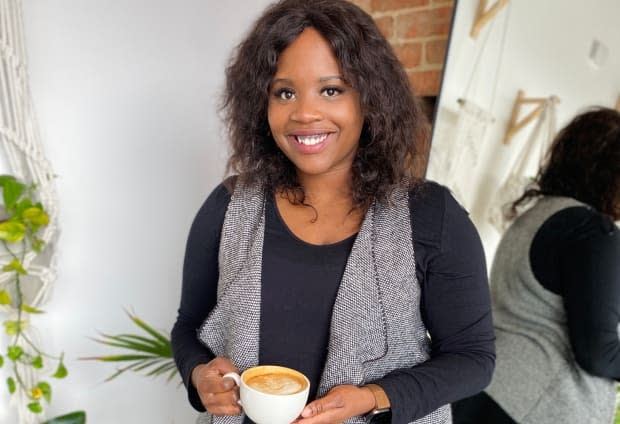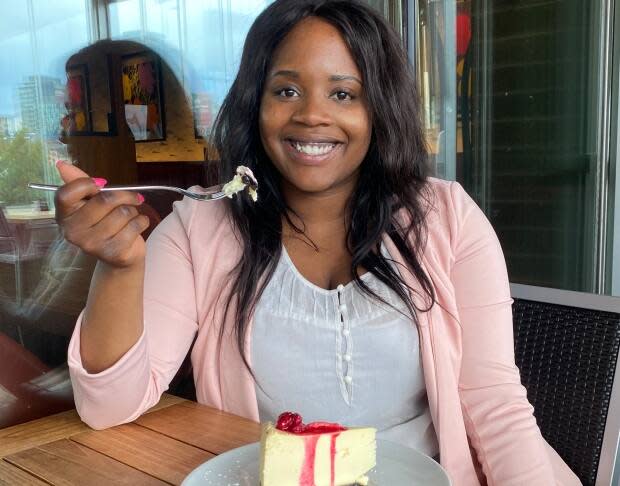Saskatoon nutritionist speaks out against 'bikini body' messaging and dieting culture

As the weather gets warmer, messages telling people — women in particular — to "get your beach body ready" or saying it's "time for a spring shed" increase in visibility.
This year, some advertisements also include an added messaging emphasizing the need to lose "lockdown love handles."
Natasha Ngindi believes these messages are toxic body shaming, and advises people to steer away from people and companies who promote such messages.
"I don't think that most people are aware of how dangerous dieting is, and just how bad diet culture is and how ingrained it is in our society," she said. "When we perpetuate diet culture ideals on each other, it's just very toxic."
Ngindi is a nutritionist and body-positive influencer on Instagram with over 16,000 followers. She has been actively speaking against dieting and social media accounts that pressure people to lose their love handles or get a "bikini-ready" body.
According to the Saskatoon anti-diet advocate, dieting is a cycle of guilt and shame about what your body looks like. She says she herself was once a victim of extreme dieting.
"In my early 20s, I went on an extreme diet. I lost 50 pounds and then I gained almost 100 pounds back, so I can personally attest to the fact that diets do not work," she said.
Diet culture is a set of beliefs that values thinness, appearance and shape above health and well-being, Ngindi said.
These ideals are reinforced through messages like "no pain, no gain" that imply that people need to restrict calories to be healthier, food is good or bad, and other ideals that do not add to a person's health, she said.
She recalls that when she dieted and initially got thinner, she felt more accepted, though no one was interested in whether or not she was actually healthy.

Ngindi's message is part of a broader movement highlighting societal pressures around body image and weight loss.
Just last month, a Montreal researcher created a graphic novel about body shaming, diet culture and medical stigma. The comic by Rachel Thomas, a PhD student at Concordia University's Centre for Interdisciplinary Studies in Society and Culture, follows a woman's journey through losing weight as she navigates social and medical stigmas, partly based on Thomas's own experiences.
"Everyone thinks they have a say in what your body should do and what your body should look like, but really, the only important person is you in that discussion," Thomas said in an interview with CBC.
Ngindi began to learn about the concept of intuitive eating and health at every size after meeting Amy Pickering, a Saskatchewan dietitian.
"When I saw her I was at rock bottom and needed to lose weight as soon as possible," Ngindi said.
"Instead of helping me lose weight like I wanted to, she showed me a different way of looking at health and fitness and I am just so thankful. It changed me completely."
She shares her story on Instagram in hopes that she will inspire people. She also has a private coaching practice, where she aims to help clients get through the same struggles she once faced.
She believes that one way to combat diet culture is to go on a social media detox and unfollow accounts that make you feel bad about what your body looks like, so the algorithm does not suggest more pages like that to you. She suggests replacing these accounts by following pages of people with realistic and varied bodies.
She also advises people to focus more on being comfortable in their bodies by realizing that it's possible to be healthy in any body type. Focusing on movement that feels right for your body is also important, she says.
Ngindi also recommends against focusing on a scale, but suggests instead celebrating victories like having more energy, strength and endurance, and better sleep.
For more stories about the experiences of Black Canadians — from anti-Black racism to success stories within the Black community — check out Being Black in Canada, a CBC project Black Canadians can be proud of. You can read more stories here.


 Yahoo Finance
Yahoo Finance 